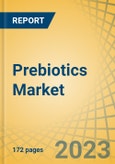Succeeding extensive secondary and primary research and an in-depth analysis of the market scenario, the report conducts the impact analysis of the key industry drivers, restraints, opportunities, and trends. The growth of this market is driven by the increasing consumption of prebiotics, the rising demand for nutraceuticals, and the increasing demand for plant-based food ingredients. However, the lack of awareness regarding the health benefits of prebiotics restrains the growth of this market. The growing use of prebiotics in infant formulas is expected to create growth opportunities for the players operating in this market. Additionally, the growing demand for natural, organic, and clean-label ingredients is a major trend in the global prebiotics market.
The global prebiotics market is segmented by ingredient (inulin, fructo-oligosaccharides, galacto-oligosaccharides, mannan-oligosaccharides, and other ingredients), application (food & beverages {dairy products, beverages, bakery & confectionery products, cereals-based products, infant food products, and other food & beverages}, dietary supplements, animal feed & pet food, and cosmetics), and geography. The study also evaluates industry competitors and analyzes the country-level markets.
Based on ingredient, the galacto-oligosaccharides segment is projected to register the highest CAGR during the forecast period. The rapid growth of this segment is mainly driven by its health benefits, such as relieving symptoms of constipation, preventing colon cancer, and promoting the growth of bifidobacteria. In the food and beverage industry, it is used in non-alcoholic beverages to enhance taste and in bakery products to improve taste and texture due to its low calorific value and moisture retention properties.
Based on application, in 2022, the food & beverages segment accounted for the largest share of the global prebiotics market. The large market share of this segment is attributed to the rising demand for fortifying food with prebiotic ingredients and increasing health consciousness among consumers. Moreover, this segment is projected to register the highest CAGR during the forecast period due to people’s inclination towards a healthy and active lifestyle, increasing investments to innovate new products in the food & beverages industry, and awareness of health benefits.
An in-depth geographic analysis of the industry provides detailed qualitative and quantitative insights into the five major regions (North America, Europe, Asia-Pacific, Latin America, and the Middle East & Africa) and the coverage of major countries in each region. Asia-Pacific is slated to register the highest CAGR during the forecast period. The growth of this market is driven by people’s growing interest in digestive health ingredients, increasing focus on improving immune health in infants, innovations in prebiotic formulations, the growing aging population, and increased consumer awareness about the link between digestive health, immunity, and overall wellness.
The key players operating in the global prebiotics market are Archer-Daniels-Midland Company (U.S.), BENEO GmbH (Part of Südzucker AG) (Germany), Cargill, Incorporated (U.S.), Cosucra Groupe Warcoing SA (Belgium), Gobiotics BV (Netherlands), Ingredion Incorporated (U.S.), International Flavors & Fragrances Inc. (U.S.), Jarrow Formulas, Inc. (U.S.), Kerry Group plc (Ireland), Roquette Frères (France), Royal FrieslandCampina N.V. (Netherlands), Sensus B.V. (Part of Royal Cosun) (Netherlands), Tereos Group (France), and Yakult Honsha Co., Ltd. (Japan).
Key Questions Answered in the Report:
- What is the current value of revenue generated by global prebiotics?
- At what rate is the global prebiotics demand projected to grow for the next 5-7 years?
- What are the historical market sizes and growth rates of the global prebiotics market?
- What are the major factors impacting the growth of this market at the regional and country levels? What are the major opportunities for existing players and new entrants in the market?
- Which segments in terms of ingredient and application are expected to create major traction for the manufacturers in this market?
- What are the key geographical trends in this market? Which regions/countries are expected to offer significant growth opportunities for the manufacturers operating in the global prebiotics market?
- Who are the major players in the global prebiotics market? What are their specific product offerings in this market?
- What are the recent strategic developments in the global prebiotics market? What are the impacts of these strategic developments on the market?
Scope of the Report:
Global Prebiotics Market Assessment - by Ingredient
- Inulin
- Fructo-oligosaccharides
- Galacto-oligosaccharides
- Mannan-oligosaccharides
- Other Ingredients
Global Prebiotics Market Assessment - by Application
- Food & Beverages
- Dairy Products
- Beverages
- Bakery & Confectionery Products
- Cereals-Based Products
- Infant Food Products
- Others Food & Beverage Applications
- Dietary Supplements
- Animal Feed & Pet Food
- Cosmetics
Global Prebiotics Market Assessment - by Geography
- Asia-Pacific
- China
- Japan
- India
- Australia
- South Korea
- Rest of Asia-Pacific
- North America
- U.S.
- Canada
- Europe
- Germany
- France
- U.K.
- Italy
- Spain
- Netherlands
- Rest of Europe
- Latin America
- Brazil
- Mexico
- Argentina
- Rest of Latin America
- Middle East & Africa
Table of Contents
Companies Mentioned
- Archer-Daniels-Midland Company (U.S.)
- BENEO GmbH (Part of Südzucker AG) (Germany)
- Cargill Incorporated (U.S.)
- Cosucra Groupe Warcoing SA (Belgium)
- Gobiotics BV (Netherlands)
- Ingredion Incorporated (U.S.)
- International Flavors & Fragrances Inc. (U.S.)
- Jarrow Formulas Inc. (U.S.)
- Kerry Group plc (Ireland)
- Roquette Frères (France)
- Royal FrieslandCampina N.V. (Netherlands)
- Sensus B.V. (Part of Royal Cosun) (Netherlands)
- Tereos Group (France)
- Yakult Honsha Co. Ltd. (Japan).








